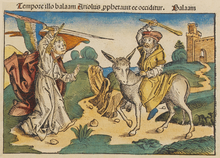Balaam
Balaam (/ˈbeɪlæm/;[1] Hebrew: בִּלְעָם, romanized: Bīlʿām), son of Beor,[2] was a biblical figure, a non-Israelite prophet and diviner who lived in Pethor, a place identified with the ancient city of Pitru, thought to have been located between the region of Iraq and northern Syria in what is now southeastern Turkey.
[3]: 166 According to chapters 22–24[4] of the Book of Numbers, he was hired by King Balak of Moab to curse Israel, but instead he blessed the Israelites, as dictated by God.
Balak, king of Moab,[7] consequently becomes alarmed and sends elders of Midian and his Moabite messengers,[8] to Balaam, son of Beor, to induce him to come and curse Israel.
Balaam finally gets taken by a now very frustrated Balak to Peor, and, after the seven sacrifices there, decides not to "seek enchantments" but instead looks upon the Israelites from the peak.
Thus the Elohist describes Balaam giving two blessings, making sacrifices on seven altars, at the high places of Baal, before each, then deciding not to "seek enchantments" after the third set of sacrifices, but to "set his face upon the wilderness," which Balak views as a third blessing, and so Balaam then gives the three final predictions of fate.
Conversely, in the Jahwist source, Balaam arrives, the spirit of God comes upon him, and he delivers a blessing and a prophecy in succession.
The seventh is also ambiguous and may either be a reference to the Sea Peoples or, in the view of some religious commentators, to the conquest of the Achaemenid Empire by Alexander the Great.
In the view of some schools of textual criticism,[9] the narrative, excepting the episode involving the donkey, is simply a framework invented to be able to insert much older poems.
[10] In this literature, Balaam gradually acquired a position among the non-Jews, which was exalted as much as that of Moses among the Jews;[11] at first being a mere interpreter of dreams, but later becoming a magician, until finally the spirit of prophecy descended upon him.
[13] The Talmud also recounts a more positive view of Balaam, stating that when the Torah was given to Israel, a mighty voice shook the foundations of the earth, so much so that all kings trembled, and in their consternation turned to Balaam, inquiring whether this upheaval of nature portended a second deluge; the prophet assured them that what they heard was the voice of God, giving the sacred law to the Israelites.
[14] According to Jewish legend, Balaam was made this powerful in order to prevent the non-Jewish tribes from saying: "If we had only had our own Moses, we would be as pious as the Jews."
When Balaam saw that he could not curse the children of Israel, the Rabbis assert that he advised Balak, as a last resort, to tempt the Hebrew nation to immoral acts and, through these, to the worship of Baal-peor.
[21] The Talmud states that "Moses wrote his book and the portion of Balaam",[22] regarding this passage as separate from the rest of the Torah in terms of topic or style, but united in authorship.
[29] Balaam is reviled as a "saviour(in terms of prophet)" in several places in the New Testament,[30] where he is cited as a type of avarice; for example in Book of Revelation 2:14 we read of false teachers at Pergamum who held the "teaching of Balaam, who taught Balak to cast a stumbling-block before the children of Israel, to eat things sacrificed to idols, and to commit fornication".
Josephus paraphrases the story more so, and speaks of Balaam as the best prophet of his time, but with a disposition ill-adapted to resist temptation.
A man also named Balaam also figures as an example of a false prophet motivated by greed or avarice in both 2 Peter 2:15 and in Jude 1:11.
However, the commentators argue that he is the one to whom the following text is referring: And relate to them ˹O Prophet˺ the story of the one to whom We gave Our signs, but he abandoned them, so Satan took hold of him, and he became a deviant.
So narrate ˹to them˺ stories ˹of the past˺, so perhaps they will reflect.The Muslim commentators explain that Bal'am bin Ba'ura (Arabic: بلعام بن باعوراء) was a Canaanite who had been given knowledge of some of the books of God.
According to another story which al-Tabari gives, Balaam was a renegade Israelite who knew the Most Sacred Name, and to gain the things of this world, went over to the Canaanites.
The curse fell automatically, and Moses, having learned whence it came, entreated God to take from Balaam his knowledge of the Name and his faith.
[45] In 1967, at Deir Alla, Jordan, archaeologists found an inscription with a story relating visions of the seer of the gods Bala'am, son of Be'or, the same name appearing as that of a prophet in the Bible.
Meindert Dijkstra suggests that "the reticence of OT scholarship to take account of the text may be attributable to its damaged state, the difficulty of reconstructing and reading it, and the many questions it raises of script, language, literary form and religious content.




